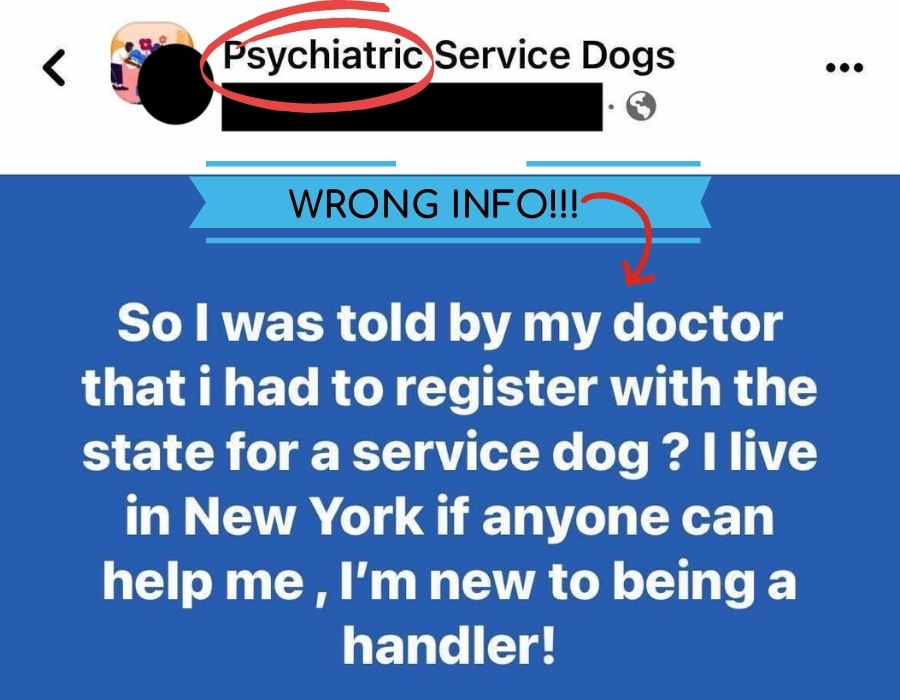
Help! My Doctor Won’t Write A Service Dog Letter
- Published on:
- By: ASP Team
Stress, sadness, anxiety, tiredness, and irritation are universal feelings but their impact and intensity have an extensive range. Not everyone experiences negative emotions as fleeting or easy to manage. For many, the struggles of everyday life take substantial tolls on mental health and wellness. Thankfully, many different treatment options exist today! Evidence shows that individuals frequently grappling with intense emotions or destructive feelings greatly benefit from the use of a Psychiatric Service Dog. So then, why are so many physicians hesitant to suggest them to their patients? That’s an important question as many are finding themselves stuck when their doctor or other licensed mental health provider won’t write a Service Dog letter.
Benefits of Assistance Animals
Studies have proven major benefits between interacting with animals and increased positive mental health. Contact with a friendly, domesticated animal not only lowers blood pressure, but raises endorphins and lowers cortisol levels. While anyone can benefit from cuddling an animal for increased relaxation, some people need them for deeper emotional support. Certain animals, known as Emotional Support Animals, provide their owners with therapeutic ways to combat their stress and anxiety. ESAs help to decrease unhealthy negative emotions overall and provide a sense of love and greater purpose to their owners. Additional benefits include diminishing physical pain and strengthening socialization skills. ESAs have even been said to help children overcome some speech disorders!

Get Your ESA Today
ATTENTION
Due to the new Department of Transportation (DOT) policy, Emotional Support Animals are NO longer allowed to fly in airplane cabins for free. However, Psychiatric Service Dogs are eligible.
What Are Psychiatric Service Dogs?
Psychiatric Service Dogs (PSDs) are not the same as ESAs, in the sense that they’re specifically trained to perform tasks that help with daily functionality. These tasks are tailored to their handler’s unique needs. PSDs offer practical assistance, while also contributing positive feelings of safety and security. They also have all the same legal rights as any other Service Dog. The major difference is they help with specific mental health challenges or learning disabilities, rather than physical challenges or major physical impairments.
How Can PSDs Help With Mental Health Disorders?
One reason they’re so advantageous is their inherent intuition. When dogs are further trained to help with task specific goals, their already innate behaviors prove to be huge assets. The canine species is instinctively better able to recognize suffering than others, and training can help utilize this prewired disposition. This makes them an asset to many mental health and wellness plans.

While other Service Dogs may act as their owner’s eyes or ears – to assist the blind, for example – or help with physical emergencies like seizures and blood sugar drops, PSDs are trained to help with a mental health crisis:
- Acting as deterrents during episodes of self-harm (like hitting, cutting, scratching)
- Guiding their owner back home in the midst of (or after) dissociative episodes
- Leading help to owners when panic or fear incapacitates them
- Keeping alert for all signs of emergency (like fire, intruders, or air-raid alarms)
- Providing assistance when panic attacks render their owner incapable
- Providing a sense of security, or even acting as security, for owners with social anxiety, panic, and PTSD
- Retrieving medication or other helpful items in mental health emergencies
Qualifications and Other Requirements
Now that we know what a PSD does and how it could be a great help, let’s look at the minimum qualifications for those seeking one. In addition to having a mental disability or psychiatric health disorder, the affected person must have a need for a task-trained companion – specifically a dog – to assist them with everyday functionality.
So what disorders, disabilities, and illnesses apply? Published by the American Psychiatric Association (APA), the Diagnostic and Statistical Manual of Mental Disorders (DSM) is widely used by doctor or other licensed mental health providers and mental health professionals to diagnose most psychiatric disorders in children and adults. Some of those disorders include (but aren’t limited to): Addiction or substance abuse, Anxiety Disorders, Bipolar Disorder, Depression and Depressive Disorders, Dissociative and Personality Disorders, Neurocognitive Disorders, Obsessive-Compulsive Disorders, Post Traumatic Stress Disorder, Schizophrenia, and other psychosis related disorders.

In addition to having a valid psychiatric diagnosis, a person is determined to need a PSD only if they have at least one mental disability that limits or prevents them from a major life activity. These activities are not specifically outlined, but can be as simple as the motivation to get out of bed in the morning. The same is true for those applying for any Service Dog, only they’d need to have one or more physical impairments.
Not all people suffering from major health conditions have a diagnosis, though. If you suspect that you may have one, it’s best to consult with a health care professional. For a list of (limited) psychiatric symptoms, you can also use the following for reference:
- Confused or delusional thought patterns
- Consistent trouble sleeping, and or sleep disturbances
- Drastic fluctuations in moods and or emotions
- Frequently recurring feelings of sorrow or sadness
- Inability to handle stress in a constructive manner
- Increased fatigue
- Intense feelings of worry, anxiety, fear, and or guilt
- Lack of concentration
- Paranoia
- Poor coping mechanisms
- Trouble with communication
- Suicidal ideation
- Uncontrolled anger or violence
- Unexplained changes in appetite
- Withdrawal from society / hobbies and activities you once used to enjoy

Not all above disorders and or mental health symptoms may be the best fit for a Service Dog. Emotional Support Pets are equally invaluable, but don’t have all the same public service rights as Service Dogs and PSDs. If task-training isn’t essential to the handler’s overall wellness routine, they’d likely benefit from getting an ESA instead. You can learn more about the differences here.
PSD Letters and Doctor Support
When doctor or other licensed mental health providers suggest that a person would benefit from having a Psychiatric Service Dog, it makes the process easier. Sadly, some patients are facing huge roadblocks when it comes to securing those recommendations. This is especially true in the midst of the mental health crisis that COVID has spurred. We now live in an era where online healthcare options are rapidly expanding. This has proven to be immensely beneficial for busy schedules, immune-compromised individuals, and even those struggling with debilitating mental health challenges which may prevent them from leaving their home. This is great news! However, individuals in need of Assistance Animals or Service Dogs are still facing some major roadblocks.

First, some health insurance networks don’t authorize their contracted healthcare professionals to sign off on PSD ownership, or even write recommendations for them. Unfortunately, insurance companies can often be driven by financial gain rather than overall patient care. Pharmaceuticals are more widely acceptable, and fiscally beneficial, than natural treatments (such as that of a Psychiatric Service Dog). Through insurance carriers, there may also be more red tape of liability that particular providers are not willing to manage.
Second, despite being able to do so, many doctor or other licensed mental health providers don’t feel educated enough to make such a judgment call. Official PSD letters require a licensed professional’s detailed medical opinion about whether someone meets basic criteria for a psychiatric diagnosis. Without inclusive knowledge of their patient’s mental health background, some general practitioners tend to shy away from judgments regarding alternative treatments. For this reason, more PSD letters come from psychiatric clinicians than primary healthcare doctor or other licensed mental health providers. As you can see, however, even utilizing a specialist can prove challenging. Thorough questionnaires should be standard. This can increase a doctor or other licensed mental health provider’s confidence in sanctioning letters, especially if an individual suffers from multiple impairing symptoms.
Other times, primary care doctor or other licensed mental health providers are simply uneducated on the laws surrounding Psychiatric Service Dogs (or Service Dogs in general). Sadly, training on this topic is not par for the course. At times, physicians may dismiss you with biased advice, dodge the conversation, or push you off by providing inaccurate information. It is important to go into appointments with your own knowledge and detailed research, though that still may not produce the desired results.
Seeking the assistance of an informed mental healthcare professional can be very beneficial. Not everyone receives affordable monthly healthcare, and even if they do, their options for in-network providers can be very limited. There are many additional reasons why a person may not want to (or even be able to) seek professional help in person. The rise in the use of online services provides a valuable resource for those experiencing unusual or challenging circumstances preventing them from physically attending a doctor or other licensed mental health provider’s appointment.

Hope for Service Dog Needs
There are multiple tidbits of good news for those who can’t get their primary doctor or other licensed mental health provider to give an approval.
First, obtaining a Service Dog letter of recommendation isn’t a legal requirement.
**To clarify, Emotional Support Animal letters ARE a legal requirement. Service Animals (PSDs) and Assistance Animals (ESAs) are different.
PSD letters certainly do come in handy when handlers experience pushback from staff or owners of public establishments, however. Not everyone is educated on the rights of the disabled community. In cases where your PSD is unlawfully turned away, providing adequate documentation of its necessity usually diffuses any doubt. Whether from a landlord, airline, hotel, or other public establishment, Service Dog discrimination happens often. Once it’s occurred, it’s unfortunately likely to continue. The best thing you can do is provide educational materials to those who are woefully uninformed.
Regardless of the situation, a Service Dog handler is only required to answer the following questions:
Is the PSD required due to a disability?
What task(s) is the PSD trained to perform?
Outside these two parameters, all PSD owners have rights to confidentiality.

Second, the 2020 HUD updates acknowledge the legitimacy of online consultations for PSD and ESA necessity.
The guidelines state “…documentation may be reliable where provided by legitimate, licensed health care professionals delivering health care services remotely, including over the Internet.” This is important as it releases those who have run into setbacks with their usual practitioners to seek help elsewhere. American Service Pets makes finding a licensed healthcare professional, who understands your specific needs, a bit easier. We partner with doctor or other licensed mental health providers across the nation who are well versed in psychiatric disorders and strongly believe in the benefits that Assistance Animals and Service Dogs provide. We do not file with medical insurance, and therefore have no hoops to jump through or network restrictions to worry about.
If you have further ESA or PSD related inquiries, don’t hesitate to contact the team at American Service Pets. You can also click here to start the qualification process.
**While animals can be assets for those with both mental and physical day-to-day challenges, it’s important to note that their ownership is a big responsibility and may not be for everyone. Those not in a place where they can care for or provide for an animal companion should consider starting with alternative options. Some suggestions would be to visit with or volunteer to work with animals in a lower commitment setting.

The benefits of an Emotional Support Animal certification and a Psychiatric Service Dog certification are drastically different. Fortunately for you, American Service Pets’ network of active board certified doctor or other licensed mental health providers can help you find the right path to certification. To find out whether you need an ESA or PSD letter, take our easy, three-step Pet Owner Survey!
More Great Resources




